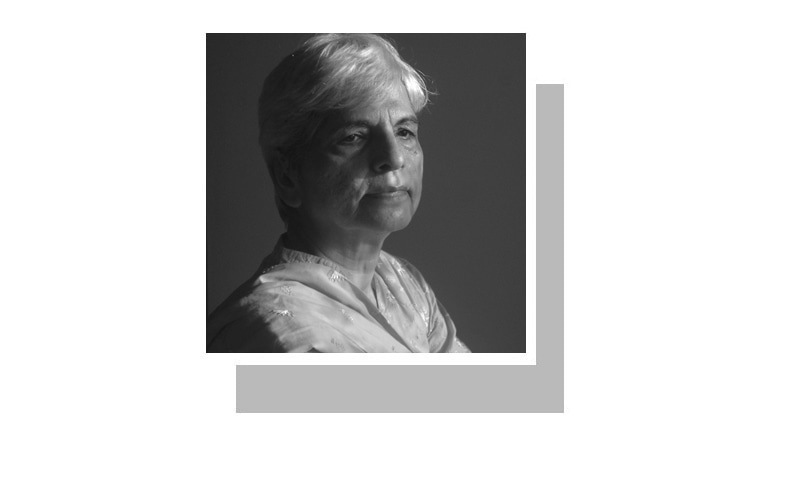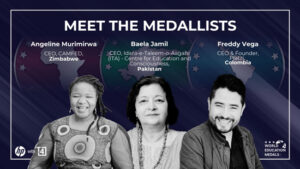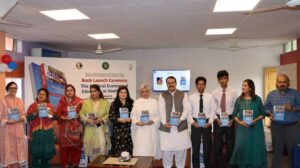A REGULAR event from the pre-pandemic age that I miss a lot is the Children’s Literature Festival spearheaded by Baela Raza Jamil. Held regularly all over the country, it was designed to unleash the power of the mind.
From the treasure trove of memories I have of the festivals, there is one that never fails to delight my heart. That was recorded at the Children’s Literature Festival held in Turbat in 2018. It was the theatre session in which a bunch of inhibited, shy and reserved youngsters comprised the participants. The resource person was Atif Badar, who struggled to overcome the language barrier with the help of two Balochi teachers. There was also the challenge of drawing the boys out of their apparent reticence.
Atif was directing a play that was to be presented before the chief of army staff. Sociocultural barriers also made the actors nervous as they were required to deliver a dialogue that to many of them must have appeared to be mumbo jumbo — Urdu not being their native language. Then something happened. With prompting from their teachers and the excitement of entering another world, the boys perked up, demonstrating confidence. Atif, who is always encouraging and reassuring as a good teacher should be, got these youngsters to perform a wonderful play, projecting the importance of storytelling and reading. The impromptu actors were wonderful and received a loud ovation from their audience.
Above all, the performers enjoyed the new experience. That is the magic of theatre. That has always attracted Atif to theatre in education which he believes is important to teach children the skill of communication and improve their confidence. He acquired his own skills from Sheema Kermani’s Tehreek-i-Niswan whose contribution to theatre in Pakistan is unmatched. Although he has been teaching theatre for 10 years in some prestigious schools in Karachi, there are few who really appreciate the value of theatre in education. At the most, theatre is equated with the annual play performed on Parents Day in schools. It is not a regular subject used as a tool of learning.
We find it difficult to allow anyone to be unconventional.
Why is theatre so important? Rabindranath Tagore, a major exponent of theatre, dance, music and culture in Bengal, said so many decades ago that in our system students are made to “abhor thinking”. They are not encouraged to analyse the world around them and become agents of the future. They have no capacity to think and understand their own world.
The British philosopher and peace activist Bertrand Russell also suggests that “children should be free citizens of the universe” with the priority being to promote the freedom of the individual, with its tremendous potential for creativity, liberty and its enormous ability to feel and react to the world around us.
Can we in Pakistan ever hope to educate our children in a manner that would really help them change their own future and that of their country? The real building blocks of theatre which captures its essence are theatre games. They liberate the mind and soul of the student. Unfortunately, our approach is too regimented to allow any kind of freedom of thought.
One would wonder how theatre can help in this. To understand what teaching theatre in education really entails, one should read Swatilekha Sengupta’s book title Theatre Games for Schoolchildren. Swatilekha Sengupta is an award-winning theatre practitioner who is a member of Nandikar which is a theatre group in Kolkata. She describes a scene from an activity that her group enacted with children. A little girl sat at the centre and her companions were asked to ready her as they liked to the rhythm of the drumbeat. Without any directions, they combed her hair and dressed her like a bride. That was creativity.
How conformist can we get? We just find it difficult to allow anyone to be unconventional.
I had a lot of fun with children when I was doing voluntary teaching. I had never learnt theatre in my school life and so I had no idea how it was taught. But I could experiment with the idea of creativity. Once I got two children to stage a job interview. It was pretty interesting and the questions posed were quite ingenious such as the boss asking, “What will your children do when you work?”
This reminded me of my job interview with the editor of Dawn, Ahmad Ali Khan, when I sat before him as a nervous young mother in 1975, hiding my jitters behind my bravado. The questions were not the usual conventional ones about my qualifications but my children. Yet the interview was a success for I remained in the newspaper for over 33 years. I do wonder sometimes if Khan Sahib had ever played ‘interview interview’ in his childhood. I hadn’t.
Published in Dawn, November 20th, 2020




